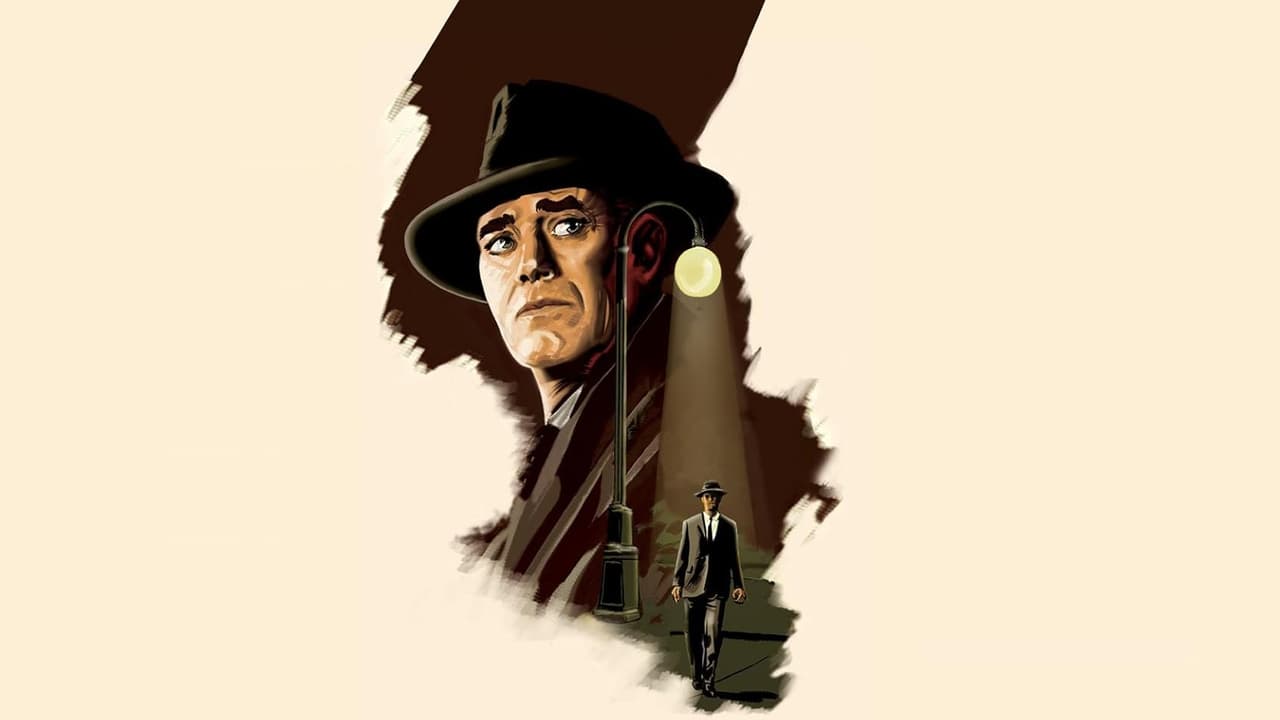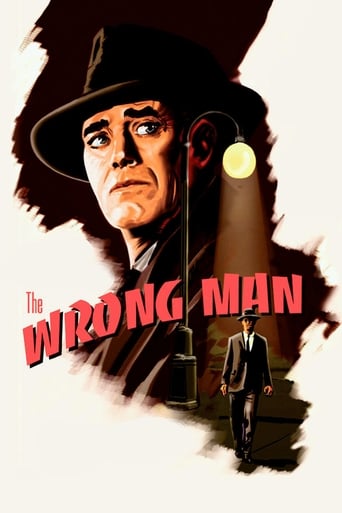

Awesome Movie
... View MoreThere's a more than satisfactory amount of boom-boom in the movie's trim running time.
... View MoreThe film never slows down or bores, plunging from one harrowing sequence to the next.
... View MoreThe tone of this movie is interesting -- the stakes are both dramatic and high, but it's balanced with a lot of fun, tongue and cheek dialogue.
... View MoreTraditionally, the tales spun by master director Alfred Hitchcock are concocted in the recesses of his own mind before being adapted for the big screen. This time, however, Hitchcock follows a different formula by tackling a true story about a wrongly accused man.For a basic plot summary, "The Wrong Man" tells the story of Emanuel Balestrero (Henry Fonda), who is falsely accused of committing numerous crimes around the neighborhood in which he lives. The film shows the process that "Manny" must go through in order to clear his name, as well as the physical and psychological toll it takes on his children and wife (Vera Miles).At its core, this is actually a very simple film. There are no jaw-dropping revelations or contrived dramatic situations. I have read that Hitch tried to be as close to the actual truth of the situation as possible with this film, and the product surely represents that philosophy.That being said, Hitchcock still manages to turn the experience into an entertaining one through his use of tension and unique camera techniques. As Manny's unbelievable story unwinds before the viewers, we can't helped be sucked in by asking ourselves "what would I do in his situation?".Thus, though not a traditional Hitchcock thriller/mystery by any means, "The Wrong Man" is a solid effort based on factual events, even further proving Hitchcock's extraordinary range of directing talents (the ability to turn a true story into gripping film).
... View MoreIf you've read any of the biographies about Alfred Hitchcock at all, you know of his fear of being locked up and his distrust of the police. This film is the perfect manifestation of those fears and, ironically, it's based on a true story. In fact, the movie opens with the director's shadowed figure speaking "what you are about to hear is absolutely true", or words to that effect, in lieu of his typical cameo.Based on the novel by Maxwell Anderson, this last effort by screenwriter Angus MacPhail, whose other feature length adaptation for the director was Spellbound (1945), tells the story of Manny Balestrero, a musician and family man who was incorrectly identified by witnesses as an armed robber.Sandwiched between his last two (of four) collaborations with James Stewart, Hitchcock uses Henry Fonda, for the first and only time, to tell this real-life noir drama. The film also marks the first of the two Hitchcock films with Vera Miles, who would go on to play Janet Leigh's concerned sister in Psycho (1960).Harold Stone and Charles Cooper play the police lieutenant and detective who, based on identifications from several women robbery victims, arrest and then process Balestrero (Fonda) through to jail - the film's most memorable scenes. Nehemiah Persoff plays Manny's brother-in-law, who comes up with the bail.The story then shifts somewhat to a focus on Manny's wife Rose (Miles), who begins to suffer a mental breakdown and she blames herself for what's happened to her husband. Anthony Quayle, who plays the inexperienced, yet competent defense council that the Balestreros hire, advises Manny to have his wife see a doctor (Werner Klemperer), and eventually she's institutionalized.A thirteen year old Tuesday Weld appears, uncredited in her first film, as a giggling girl that the Balestreros come across while trying to find witnesses for his defense.The subplot of Rose's collapse notwithstanding, the film is still pretty good even with its hokey ending, then again it's based on a true story.
... View MoreA Kafkaesque narrative, based on a story that actually happened, starring the highly expressive and excellent Henry Fonda along with a very good, and particularly beautiful Vera Miles alongside him. The classic theme: a man wrongfully accused, his trial and tribulations, and the lingering question, seemingly forever - is he even really innocent at all ? What a man can lose when he is being convicted, often far more than just material loss. His perseverance in this personal battle against what seems to be the entire world. The glimmers of hope, the devastating news, and Fonda's character's world that seems to come apart bit by bit, something almost of a Job's parallel from the Bible.Very well made, constantly compelling and suspenseful in its own way. And an ending worthwhile.
... View MoreThe Wrong Man lacks a lot of great aspects one would expect from a director as legendary as Hitchcock. The main problem is that the title of the film can easily be applied to other Hitchcock films. This movie takes a plot device Hitchcock recycled a few times in his career (the wrong man is accused of a crime) and sets it into a film which lacks the energy and suspense that Hitchcock is known for.In films like North by Northwest and Saboteur, Hitchcock takes this notion of the wrongfully accused man and puts him on a thrilling journey to find the people who had set him up and prove his innocence. In The Wrong Man, we have the innocent Henry Fonda - an actor so often playing the role of the good guy in cinema that it gets monotonous - fill the role of the wrongfully accused and he is put through the process of justice. He is questioned, arrested, bailed out, attends trial - you know, the opposite of what happens in North by Northwest and Saboteur. It proves to be a really boring story to watch as the protagonist is not fighting for his life, but rather simply denying the crimes he is accused of and hoping for the best.To be honest, Henry Fonda feels out of place in a Hitchcock film. He is more of a passive actor, more subtle than famous Hitchcock actors like Cary Grant and James Stewart. Those actors play their roles in Hitchcock films with true passion, clearly portraying fear and desperation. Fonda's performance in The Wrong Man lacks the passion we expect from a protagonist in a Hitchcock film.While Bernard Herrmann usually creates really interesting and powerful scores for films - especially for Hitchcock films like North by Northwest and Vertigo - here his music, like the film as a whole, lacks energy, and it specifically seems to repeat the same two-note theme over and over again. It fits the tone of the movie - this film is more of a drama than a typical Hitchcock thriller - but at the same time it is overly monotonous and hardly adds any feeling to The Wrong Man.Not a waste of time to watch, but The Wrong Man is simply disappointing compared to the rest of Hitchcock's canon, which is filled with masterpiece thrillers that will continue to be discussed for decades to come.2.5/4.0
... View More